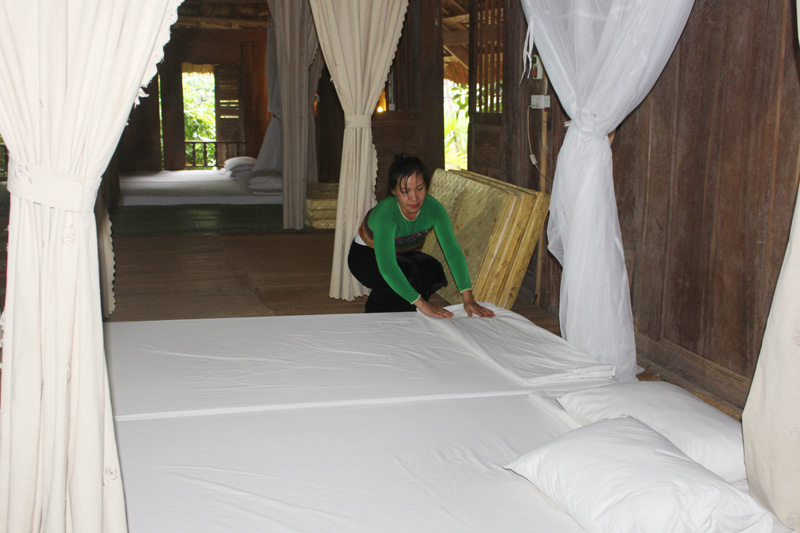
(HBO) – Untouched rustic Mai Hich commune, which is emblazoned with ripen rice terraces surrounded by mountain ranges and trails covered by white smoke streaking from local houses’ roofs, has grown in stature among domestic and international visitors in recent years.
Photo:
Homestay Minh Tho in Hich 2 village, Mai Hich commune (Mai Chau district) is a
favourable accommodation among travel companies.
Community-based
tourism has undergone positive changes and brought stable income to local
people. There are seven households offering homestay services and three
villages developing community-based tourism, comprising Hich 1, Hich 2 and Cha
Lang. In the first half of the year, the commune welcomed over 1,600 visitors, 900
of whom are foreigners, and raked in nearly 600 million VND in tourism revenue.
The commune has mobilised locals to promote community-based tourism after
seeing its economic benefits. It has also asked the locals to pay attention to
ensuring environmental hygiene to lure more holiday-makers to the locality.
Connections between villages and tourist attractions help visitors have
brilliant experience during their stay.
Ha Cong Minh, a homestay owner in Hich 2 village, said: "How to make tourists
feel comfortable and enjoyable is what we care. We have teamed up with travel
agents to set up tours for visitors to go sightseeing, enjoy stunning views of
waterfalls and landscape of rural areas as well as involve in local activities
like rice harvesting, fishing, brocading and experience traditional dishes and
cultural exchange.
The Centre for Community Health and Development (COHED) has supported homestay
service providers in Hich 2 village with necessary skills and knowledge as well
as capital to develop community-based tourism since 2010. The commune is home
to 120 Thai ethnic families, who have preserved nearly 90 percent of their
traditional stilt houses.
Bestowed with natural landscapes and tourism investment, coupled with local
hospitality, Mai Hich has become an attractive draw for tourists to discover
spectacular sceneries and ethnic traditional culture. It is expected to make
community-based tourism a major currency earner of the commune./.
Spanning thousands of hectares and winding gracefully along mountain slopes, hillsides, and riverbanks, the terraced rice fields of Lac Son District present a stunning and captivating beauty. This region, renowned for its remarkable terraced landscapes, is also the centre of Hoa Binh Culture known for numerous archaeological sites.
The life of Mong people in Hang Kia and Pa Co communes of Mai Chau district has improved much thanks to tourism development.
The man-made Hoa Binh Lake, with a water surface area of approximately 9,000 hectares and a capacity of 9.45 billion cubic meters, stretches over 200 kilometers from Hoa Binh to Son La provinces. With the goal of developing into a national tourism area, the Hoa Binh Lake tourism area is expected to not only become the largest tourism centre in the province but also one of the 12 key tourist destinations in the northern midland and mountainous region of Vietnam.
Da Bia hamlet, now Duc Phong, in Tien Phong commune, Da Bac district, was once almost isolated from the outside as the only way to the hamlet was to get a boat ride across the Hoa Binh reservoir. However, as its tourism potential has been unleashed, the hamlet has established itself as one of the most attractive destinations on the tourism map. It has even received the ASEAN Community-Based Tourism Awards in 2019.
In the first 9 months of 2024, Mai Chau district, Hoa Binh province welcomed over 684 thousand visitors to visit and relax. In which, over 516 thousand domestic visitors and more than 168 thousand international visitors. Total revenue from tourism is estimated at over 821 billion VND.
Da Bac district, bestowed with stunning landscapes, is developing ecological and resort tourism offerings. Several tourist sites, put into operation this year, has attracted throngs of high-spending and young domestic visitors.



